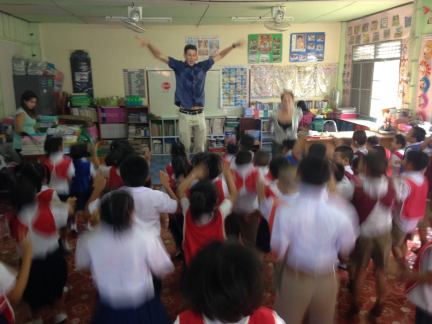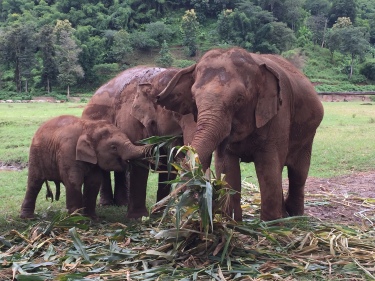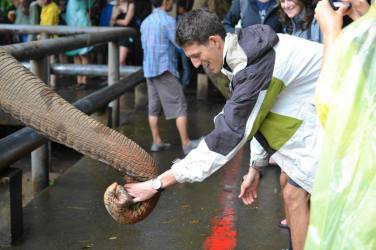The highly anticipated English camp is now behind me. I have officially taught a class! Let me explain:
My TESOL course is taught at a local Thai school in Chiang Mai by a hilarious British woman named Michelle. For the last two days of Thai school, we all separated and taught the Thai students English. We spent all week creating, practicing, and refining lesson plans and were thrown into classrooms to teach students from 3 years old all the way to 16 years old. I taught Kindergarten 1 and 2 (3-5 year-olds) with two of my classmates, Lauren and Sarah, on Thursday and Pratham 1 and 2 (6-8 year-olds) on Friday.
Kindergarten 1 and 2
What a fun time- these kids have so much energy! Luckily my teaching style is very energetic, goofy, and loud so the kids responded well. Michelle told us to teach the students English words for actions. There could not be a more perfect topic for crazy little children. We decided to have lots of physical activity involved in our lesson to make it really fun so we started with a game of “freeze dance.” We played “Twist and Shout” and the children danced until the music stopped, when they would fall to the ground and giggle with excitement. We could’ve played this game for the entire hour, the kids could not get enough of it! Of course we had to teach them something, so we went over flashcards with monkeys performing our five vocabulary words: “dance, jump, run, walk, and stop.” Between each word we would perform the action while saying the word repeatedly, having the children copy us to help them associate each action with its meaning. For example, I would say “jump!” and they would jump as high as they could until Lauren or Sarah would yell “stop!”

By this time the kids were amped up so we slowed the pace of the class with a worksheet: trace the vocabulary word and color in the picture of the action next to that word. For how loud and excited the children had just been, I could not believe how happy they were to sit on the floor and color for an extended period of time; it was a much-needed breather. After the children had colored their brains out, we formed a conga line/ choo-choo train. As the “conductor” at the front of the line, I would call out a word and everyone would perform that action as we slowly moved around the classroom and eventually the playground outside.
The children loved the high energy activities and it was surprisingly easy to get them to focus. Although the day was exhausting it was amazing to see how much the children had actually learned. At the end of the day we quizzed them on all the action words and they remembered four out of five of them! It was incredible to witness how important repetition and word association are while learning!
Pratham 1 and 2
I could not imagine how different this would be from kindergarten. As soon as I stepped in the classroom it was obvious that I needed some more complex tactics to get their attention on their last day of school. Even though these children were only a couple years older, they were much more rambunctious and distracted in the classroom. I quickly learned how as a teacher you must be ready to think on your feet and change your lesson plan to better suit the children you’re teaching. I went in with a concise lesson plan about healthy and unhealthy foods that worked well in practice but was not fully absorbed by the children the way I had hoped. I ended up clapping, playing interactive games, and randomly breaking out into song often to grab the attention of the students. I also made up a song a couple days earlier that seemed to engage the students at the beginning of each lesson:
Sung to the tune of the military cadence “I don’t know what I’ve been told” while marching in place:
I like eating healthy food! (students repeat)
It tastes good and makes me strong! (students repeat)
I like eating cookies too! (students repeat)
But they are not good for me! (students repeat)
Pizza, pizza, pizza, pizza! (students repeat)
Everybody loves pizza! (students repeat)
This song is so simple and ridiculous but did the job of grabbing the students’ attention.

As each lesson progressed I figured out which parts of my lessons worked, which didn’t, and how to best connect with the students. It was also becoming easier to control the students. There was one boy named Doi who I was told to watch out for who Michelle said “ran the school.” He was known to freely roam the school grounds and never listen to teachers. Even though he walked around eating fried chicken for half the class, I was excited that I got him to sit quietly, raise his hand, and participate in a few activities! Even though I’ve only taught classes for two days, I feel much more confident that I will be able to successfully teach English at a Thai school.
Stay tuned to hear about my school placement and trips to the Elephant Nature Park, Sticky Waterfalls, and Pai!



Leave a Reply